Cabrini University’s commitment to hands-on, social justice education was exemplified as the communication department’s student-run newspaper secured a silver pinnacle award and the senior capstone honors convergence class won a Gold Davey.
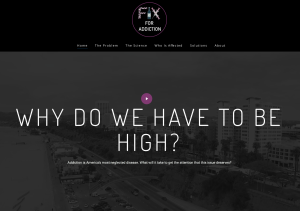
The 2016-2017 honors senior convergence class won a Gold Davey for a website in activism. The class produced the multimedia website Fix for Addiction to raise awareness on the issue of substance abuse and addiction and to advocate for change.
Cabrini alumnus Drew Vernon, the project manager for Fix for Addiction, said a goal of the website was to cover the topic thoroughly and from as many different perspectives as possible.
Vernon said, “We tried to cover every angle of the topic that we possibly could so we had to understand every point of view from people involved including addicts, political officials, health care professionals and even drug traffickers. I think that overall, we did a good job on collecting stories and information and presented them in a very professional way.”
The comprehensive content made the website good, but it was the visuals and the use of media that made the website award-winning, according to Vernon. To convey that addiction is not limited to one demographic, socioeconomic group or location, the class used footage from seven states, from California to New York.
“Our visuals are, in my opinion, what turned our site from good to great,” Vernon said. “Since substance abuse and addiction is not confined to one location, we made sure we covered multiple settings.”
Cathy Yungmann has been teaching honors convergence for 13 years and commended the team for their commitment to covering such a vast amount of content in a unique way.
Yungmann said, “It shows the depth of content and creativity of the students in last year’s convergence class. They worked really hard.”
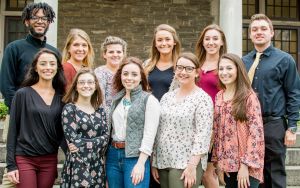
The Davey Awards honor the best in web design, video, advertising, mobile and social from small agencies worldwide. The Davey Awards is a way for small-scale organizations to be recognized for their achievements.
“It’s judged by the Academy of Interactive and Visual Arts, which is a large, international organization with a lot of big organizations a part of it,” Yungmann said. “Because it’s so hard for smaller organizations, like Cabrini, to compete against Microsoft and MTV and all those other organizations, they created the Davey Awards for smaller organizations.”
According to Yungmann, about a third of the convergence sites she has worked on have won awards. It was not surprising to her or to her students that Fix for Addiction would be securing another award.
“Honestly, in my opinion, I knew it was only a matter of time until we started receiving awards,” Vernon said. “From the beginning, I knew we had a very talented group and when I became project manager, I relayed to the group that not only did I want us to win awards but I wanted our website to be the best convergence project Cabrini has ever seen or will ever see. With all that being said, the most important thing our project can gain is recognition for this issue. I hope that what we created can make a difference in some way, shape or form. That would be most rewarding.”
The dedication and talent of his peers helped Vernon’s class create an award-winning website, but Vernon said nothing would have been achievable if not for his Cabrinian education and the help of his encouraging professor.
Vernon said, “Without the guidance of Cathy Yungmann, this project does not happen. Period. She is very experienced and was always very insightful. She was an enormous help in every aspect of the project.”
Soon after she heard her 2016-2017 convergence class won the Gold Davey, Yungmann and the head of the communication department, Dr. Jerry Zurek, were awarded the Compass Award at Cabrini’s 2017 gala.
The Compass Award is given to an individual who has displayed a clear direction in recognizing and respecting the dignity of the human person in the spirit of the Cabrini tradition.
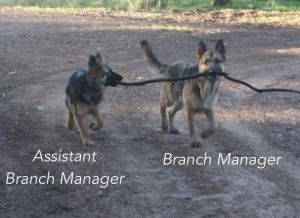
“It’s about kind of promoting human dignity and social justice long term,” Yungmann said. “This year, Dr. Zurek and I won it together because we worked as a team for more than 30 years, designing the curriculum— along with other faculty members— and promoting social justice along the way. So, that was really I think why we got the award. Because we really push social justice as part of the curriculum almost before other majors did.”
To both Yungmann and Zurek, the capstone class is more than a converging of department skills. They treat is as an Engagements of the Common Good 400 class, where the students take their communication knowledge and combine it with their commitment to social justice to enact change.
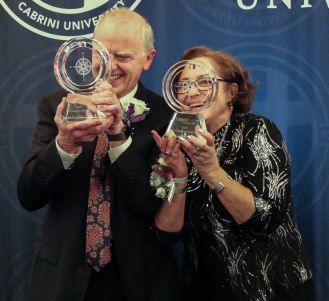
Yungmann said, “It is the capstone of the social justice component of the curriculum as well as capstone of the communication major curriculum. So it’s combining being able to create multiple media and tell a story for the social good. That’s really how it comes together. We invented this kind of project and— this is the 13th year— other universities and colleges around the country are starting to copy this kind of capstone project.”
“I say it all the time: You can get the same technical education in communication at just about any school,” Zurek said. “We all teach journalism. We all teach video. What’s different is that our students not only learn about issues that are going on in our world, but take action and are committed to solving these very complicated problems. Combining communication skills with a deeper understanding of particular issues, I think that’s what elevates and our communication program so that when you’re a senior, you’re coming up with this in-depth website on a particular issue and other universities don’t do that, where you have a whole year in which each of you dig deeply and you’re trying to bring about social change.”
Many of the honors convergence students began learning to combine communication skills with social justice in Zurek’s journalism course.
This skill is exemplified as the 2016-2017 Loquitur staff won a Silver Pinnacle for Best [less than weekly] Newspaper of the Year.
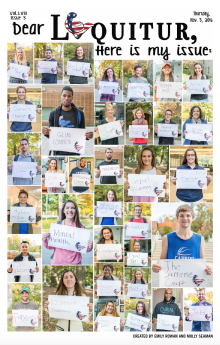
Cover graphic designed by Emily Rowan and Molly Seaman.
Cece Heckman, editor in chief and executive producer of the Loquitur as well as current project manager for this year’s convergence class, is especially proud last year’s staff won for two main reasons.
Heckman said, “I think winning the pinnacle was really significant for us, even for second place, just because— first of all, we haven’t been nominated in that major category for a very long time. So to jump into that category, first of all, and then to jump in and get second place and beat out one of the schools that won it last year was a really big deal for us. But also, it really just meant to me that our staff did well with the transition and working through all of the issues that we had throughout the year. We were able to produce really good product.”
Heckman attributed her social justice education as a reason the Loquitur staff had such a successful and productive year.
“The fact that we have such a social justice focus really played a big part in the award.” Heckman added, “Because a lot of the time, that’s what really pushes us to do the more large stories that we do. The three issues that were nominated for the award were all based on social justice issues.”
The seventh issue from the 2016-2017 Loquitur year focused on domestic violence, the ninth issue focused on Syrian refugee and the third issue, the one that won the pinnacle, was centered on issues in the election.
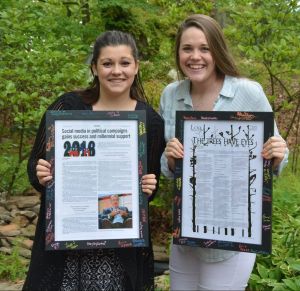
Molly Seaman, who described her time as the Managing Editor for Loquitur Media as one of her greatest accomplishments during her time at Cabrini University, said social justice has become an incredible part of her education experience.
“During my time at Cabrini, I have taken our mission very seriously,” Seaman said. “Receiving an education of the heart allowed me to produce stories and content that mattered. My best stories time and time again were the ones that I fully immersed and poured my heart, thoughts and feelings into. Those were the ones that people most often related to and were drawn to the most, which meant the world to me.”
Both Heckman and Seaman said Zurek’s support caused them to be better writers, leaders and activists for social change.
“Dr. Zurek is a pusher,” Heckman said. “Basically, no matter what you hand in, if he thinks you can do better— which he probably does— he’s going to push you to do that. I think he’s really the motivator. As much as everyone will complain, he’s the reason we have the confidence to cover such big topics.”
While the convergence class and the Loquitur staff say their professors are a significant reason both were so successful, Yungmann said they won the Gold Davey, the Silver Pinnacle and even the Compass Award because of the students, not the professors.
“I think that winning the awards is a tribute to our students,” Yungmann said. “Of course winning the media awards— the Davey and the Pinnacle— is a tribute to the students’ work. But even Dr. Zurek and I winning the Compass Award is really a tribute to our students. It’s the students who graduate and go on to do great things in their lives that are evidence of what Dr. Zurek and I have done here over the years that we have worked with them. So, to me, it’s all about the students.”



